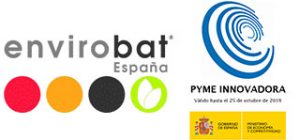Finalization of Ausebat

Envirobat Spain has completed the AUSEBAT (Automatic Selection Battery) project, whose main objective is to develop significant improvements in the management of waste from AA and AAA batteries, specifically in the triage, classification, and selection process of these wastes arriving at its facilities. This was achieved by incorporating a modern and innovative classification and selection process (pioneering and unique in Spain, having previously only been tested in diamond mines) that guarantees an efficiency of 99.9% through the use of multi-density channels. The simultaneous use of multiple density curves allowed for unprecedented separation performance, thanks to the features of the software integrated into the modern equipment, developing the following:
- The processing of information on objects and areas;
- Direct detection of objects via software – eliminating the need for 3D laser;
- Resource optimization; and,
- Flexibility, due to the use of new X-ray sensor technologies.
The AUSEBAT Project was born from the need to provide innovative solutions in waste management and the environmental challenges it entails. The proper and correct selection, triage, and classification of waste from AA and AAA batteries reduces contamination risks, increases recycling levels, and enhances the recovery of components present in them as secondary raw material.
AUSEBAT had an approximate execution duration of 16 months and was developed solely by Envirobat and its talented team of professionals, who continue to work toward building a better future. The successful implementation of the project has had a significant impact by creating highly qualified, high-value jobs in the recycling industry and providing the company with enhanced competitiveness to ensure stability and competitiveness for its plant. Moreover, it contributes to developing and strengthening a highly skilled workforce across all parts of the recycling industry’s value chain.
The AUSEBAT Project has been promoted by the Ministry of Sustainable Development and its Directorate General for the Circular Economy of the Junta of Communities of Castilla-La Mancha, within the framework of its Aid Program provided under the Support Plan for the Implementation of Waste Regulations of the Recovery, Transformation, and Resilience Plan funded by the European Union – Next Generation EU, specifically with an aid intensity amounting to 70% of the investment made in the project.
With the development of AUSEBAT, the following most significant achievements can be mentioned:
- Substantially improved the classification, selection, and triage process of discarded AA and AAA batteries, obtaining from them a portfolio of high value-added by-products for their use as secondary raw material.
- Enhanced the overall energy efficiency of Envirobat’s industrial facility, resulting in a 21.08% reduction in energy consumption.
- Supported the transition towards a climate-neutral economy with a considerable reduction in GHG (CO2) emissions, specifically: 2,600.09 t CO2eq.
- Contributed to drastically reducing the environmental impact generated by 2,960.931 tons of AA and AAA battery waste within the framework of European waste management.
- Reduced the use of primary materials: lowering the gross demand for virgin Zinc raw material by 319.42 tons by substituting it with high-quality Black Mass as secondary raw material.
- Demonstrated a technically viable, economically sustainable alternative that offers low-impact environmental solutions.
- Showed a pathway towards an innovative future business model based on Industrial Symbiosis and the Circular Economy.
- Stimulated knowledge and research into new recycling processes for recovering by-products and utilizing them as secondary raw material in the industry’s value chain.
- Raised public awareness in the SME and industrial sectors, demonstrating that Industrial Symbiosis is possible and that waste is an untapped resource.
- Created new jobs – sustainable, stable, and qualified “Green Jobs.”
The knowledge acquired by Envirobat Spain, as a result of the industrial innovation carried out, will undoubtedly help in the implementation of new lines of research, experimental development, and industrial innovation. In this regard, the know-how acquired through the development of the project is fundamental in addressing and focusing on other R&D projects.












Leave a Reply
Want to join the discussion?Feel free to contribute!